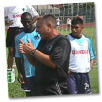What do Doctors Know?
Doctors and Chiropractor are not trained in exercise. They have no idea how a healthy body responds to the various stimuli of training. I know you have to be careful when you paint with a broad brush stroke, but this is true in the vast majority of times. I have recently run into a situation where an athlete that I have helped over the past few years has had a flair up of chronic back problems. The athlete is seeing a chiropractor that is encouraging her to jog. I want her to sprint hills (she is a chronic over strider and hills control your stride and there is less impact forces uphill). Why jog? It just will be more pounding. Several years ago I was at a conference where one of the team physicians of a major west coast university gave a presentation. He reported that in the past year that there were twelve sacral stress fractures in the distance runners at his university. He proceeded to give an exercise prescription that was so far off the wall; I almost fell out of my chair. It was like the sacral stress fractures were a fait accompli, instead of asking why sacral stress fracture, much less twelve of them. You need to get with the coach and find out why?
I had a team physician for a major league baseball team tell me we needed to test for max VO2 because the players were not fit enough. He felt that testing Max VO2 would encourage them to do more aerobic work and get fitter. He was trying to sell this to ownership! Of course coming from a doctor it had value! A baseball player does not run a mile in the course of a season. This is just an example of how out of touch many doctors are.
As coaches, trainers and therapist we have to work with the doctors to help them understand what we do. I have been lucky over the years to work some doctors who were willing to come out to workouts and observe what the athletes were doing in training. It gave them a better understanding of the stresses the athlete were putting on their bodies day to day. I think that should be a requirement in a sports medicine fellowship. The doctors should have to spend three weeks with a coach at workouts. They will then at least have some understanding.


3 Comments:
Amen.
As advisors and coaches, we need to know where our expertise ends regarding athlete health.
The same is true on the other end.
Nice points
Will
This is a good post. Yes, it's a broad brush but I tend to agree. I happen to have a *very* good Chiropractor but my experience with traditional medicine has been poor. Most doctors - even sports/ortho guys - seem to have no idea what's going on with athletes, esp endurance athletes. Everytime I have an injury and go to a doctor, I feel like I'm calling tech support for my computer. They tell me what I already know and then suggest stuff that seems bizarre for the symptoms/research I've already done. It's frustrating. There are good ones out there but they're hard to find.
Mark makes the best point here, unfortunately also defining that point himself. Being a "Doctor" doesn't mean crap. Having more letters after your name than a bowl of vegetable soup just makes you look like you have a self-esteem issue. He makes such good points, about credentials that someone may have not guaranteeing anything, but then his first statement is whining about "Chiropractors are doctors too!". Yes, you're a doctor of chiro... blah blah blah. Hey, don't leave out the doctors of homeopathy, optometry, the metaphysical, the healing power of crystals, naturopathy, osteopathy, allopathy, and anything else you want to throw in there. You discredit yourself the instant you felt it necessary to make sure everyone knows you're a "doctor" ...well ladeefrikin'da. The point everyone appears to be making is to go to someone, anyone, whose methods work. That likely means a "word of mouth" recommendation from a mentor/coach etc.
I mean, how many letters does Mr. Gambetta have after his name? Wanna buy another vowel Mark?
Post a Comment
<< Home